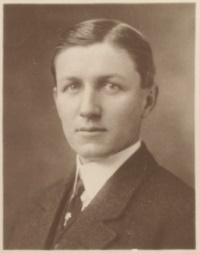

Patrick Henry Drewry (24 May 1875–21 December 1947), member of the House of Representatives, was the son of Emmett Arrington Drewry and his second wife, Altayera Laughton Booth Drewry, and was born in Southampton County, where his father practiced medicine. His first cousin, William Francis Drewry, became a prominent psychiatrist and superintendent of Central State Hospital. Drewry attended McCabe's University School in Petersburg, graduated from Randolph-Macon College in 1896, and taught English and Greek at Centenary College, a Methodist preparatory school in Palmyra, Missouri, before attending the University of Virginia's law school from 1897 to 1899. Drewry may have practiced law in Missouri briefly before establishing a Petersburg practice by June 1900. He married Mary Elizabeth Metcalf in Palmyra on 18 April 1906. They had three sons.
Drewry took an active part in local Democratic Party politics and in 1911 won election to the Senate of Virginia from the district of Petersburg and Dinwiddie County. Reelected in 1915 and 1919, he served on the Committees of Courts of Justice, on Fish and Game, on Public Institutions and Education, and on Roads and Internal Navigation. He chaired the Committee on Fish and Game beginning in 1918 and became ranking member of the Committees of Courts of Justice and on Enrolled Bills in 1920. Drewry introduced in 1912 the bill that created the Bureau of Vital Statistics in the state Department of Health and required the registration of all births and deaths in Virginia. He also chaired the commission created in 1916 that included former Speaker of the House of Delegates Richard Evelyn Byrd (1860–1925), George Landon Browning, a future member of the Virginia Supreme Court of Appeals, and LeRoy Hodges, the state's first budget director, to study the organization of the state's government and recommend reforms to increase efficiency and reduce cost. As a result, in 1918 the General Assembly passed the first comprehensive state budget act, one of the enduring reforms of the administration of Governor Westmoreland Delaware Davis.
In a special election on 27 April 1920 Drewry, running without opposition, won the vacant seat in the House of Representatives from the Fourth District, which comprised Petersburg and Hopewell and the counties of Amelia, Brunswick, Dinwiddie, Greensville, Lunenburg, Mecklenburg, Nottoway, Powhatan, Prince Edward, Prince George, Surry, and Sussex. (In 1935 the counties of Appomattox, Buckingham, and Cumberland were added to the district.) Elected to a full term in November 1920, he was subsequently reelected every second year for the remainder of his life. Drewry was never an influential leader in the Democratic Party's dominant faction, the organization that Harry Flood Byrd (1887–1966) led, perhaps because he had been an ally of Claude Augustus Swanson, the party leader Byrd had supplanted. Still, he was entirely in sympathy with the conservative, small-government, pro-business policies that were the Byrd organization's hallmarks. After several years' membership, Drewry became chair of the Democratic Party's congressional campaign committee in 1935. Together with most of the other Virginia congressmen during the 1930s, he initially supported the emergency reform measures of the New Deal; but the federal programs were more popular with the state's voters than with most of the state's representatives, and he remained skeptical of or hostile to many of its major reforms.
Drewry served on the House Committee on Naval Affairs beginning in August 1922 and was appointed to the board of the United States Naval Academy in 1925. Early in 1926 he introduced legislation establishing the Petersburg National Military Park (later the Petersburg National Battlefield). From 1933, when Swanson became secretary of the navy, through World War II and until his final term in Congress, Drewry was second in seniority on the committee. In 1947, with the reorganization of congressional committees, he stood second in seniority on the new Committee on Armed Services.
Drewry wrote and in 1923 published two well-researched histories, a book on the Washington Street Methodist Church in Petersburg, of which he was a longtime member, and an article in the William and Mary Quarterly on the history of Fort Henry, the seventeenth-century site on which Petersburg had been founded in the eighteenth century. Randolph-Macon College awarded him an honorary doctorate of laws in June 1946. Patrick Henry Drewry died of a heart attack in Petersburg on 21 December 1947 and was buried in Blandford Cemetery.
Sources Consulted:
Biographies in Philip Alexander Bruce, Virginia: Rebirth of the Old Dominion (1929), 3:336–338, Robert C. Glass and Carter Glass Jr., Virginia Democracy (1937), 1:368–369, and National Cyclopędia of American Biography (1956), 41:299; Birth Register, Southampton Co., Bureau of Vital Statistics (BVS), Commonwealth of Virginia Department of Health, Record Group 36, Library of Virginia; Petersburg Daily Progress, 18 Apr. 1906; Commonwealth 4 (Feb. 1937): 15–16 (portrait); Patrick Henry Drewry Papers, Albert and Shirley Small Special Collections Library, University of Virginia, Charlottesville; Drewry, The Story of a Church: A History of Washington Street Church (Methodist Episcopal Church, South) at Petersburg, Virginia, 1773–1923 (1923), and "Fort Henry, Selection of Site," William and Mary Quarterly, 2d ser., 3 (1923): 1–22; Drewry's statement in House of Representatives, Committee on Military Affairs, 69th Cong., 1st sess., hearing on National Military Park near Petersburg, Va. (8 Feb. 1926), HR 7817; obituaries in New York Times, Norfolk Virginian-Pilot, Petersburg Progress-Index (portrait), Richmond News Leader, and Richmond Times-Dispatch, all 22 Dec. 1947, and Washington Post, 23 Dec. 1947; editorial tributes in Petersburg Progress-Index and Richmond News Leader, both 22 Dec. 1947, and Norfolk Virginian-Pilot and Richmond Times-Dispatch, both 23 Dec. 1947; Memorial Services Held in the House of Representatives of the United States, Together with Remarks Presented in Eulogy of Patrick Henry Drewry, Late a Representative from Virginia (1950).
1912 Legislative Photograph courtesy of Library of Virginia, Visual Studies Collection.
Written for the Dictionary of Virginia Biography by Brent Tarter.
How to cite this page:
Brent Tarter, "(1875–1947)," Dictionary of Virginia Biography, Library of Virginia (1998– ), published 2023 (http://www.lva.virginia.gov/public/dvb/bio.asp?b=Drewry_Patrick_Henry, accessed [today's date]).
Return to the Dictionary of Virginia Biography Search page.


